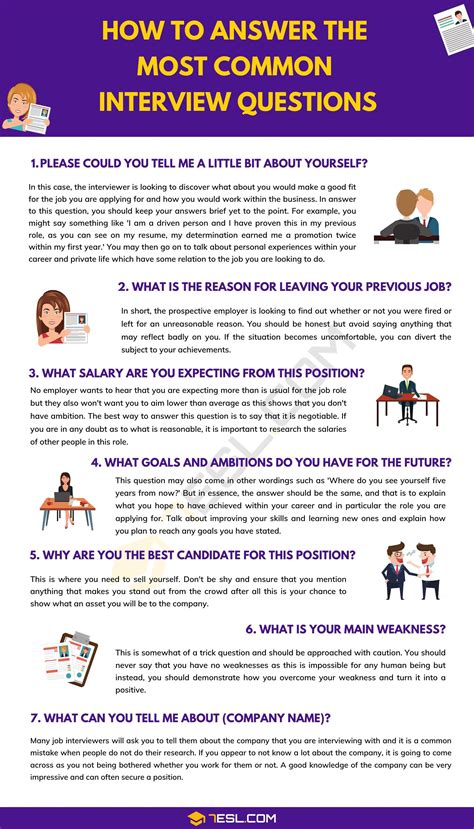Answering Common Interview Questions: 28+ Insights & Tips

Job interviews can be nerve-wracking experiences, especially if you are not prepared. Most job seekers know that they need to dress professionally and arrive on time, but what about the questions that will be asked during the interview? In this article, we will provide you with insights and tips to help you answer some of the most common interview questions.
1. Tell me about yourself
This is usually the first question asked during an interview. It is an opportunity for you to introduce yourself and give the interviewer a brief overview of your skills and experience. Keep your answer concise and relevant to the job you are applying for. Avoid talking about personal information such as your hobbies or family.
Tips:
- Focus on your professional background and experience
- Highlight your skills and achievements
- Relate your experience to the job you are applying for
2. What are your strengths?
This question is designed to assess your skills and qualities that are relevant to the job. Be prepared to provide specific examples of how you have used these skills in the past.
Tips:
- Choose strengths that are relevant to the job
- Give specific examples of how you have used these skills
- Emphasize how your strengths will benefit the company
3. What are your weaknesses?
This question can be tricky, as you don’t want to give the impression that you are not capable of performing the job. However, it is important to be honest about your weaknesses and show that you are aware of them.
Tips:
- Choose a weakness that is not critical to the job
- Show that you are working on improving your weakness
- Emphasize the positive aspects of your weakness
4. Why do you want to work for our company?
This question is designed to assess your knowledge of the company and your level of interest in the job. Do your research before the interview and find out as much as you can about the company.
Tips:
- Research the company before the interview
- Highlight specific aspects of the company that interest you
- Emphasize how your skills and experience will benefit the company
5. Why should we hire you?
This question is your chance to sell yourself and convince the interviewer that you are the best candidate for the job. Be prepared to provide specific examples of how your skills and experience match the requirements of the job.
Tips:
- Highlight your skills and experience that match the requirements of the job
- Provide specific examples of how you have used these skills in the past
- Emphasize how you will benefit the company
6. What is your greatest accomplishment?
This question is designed to assess your level of achievement and your ability to set and achieve goals. Choose an accomplishment that is relevant to the job and demonstrate how it has benefited your previous employer.
Tips:
- Choose an accomplishment that is relevant to the job
- Show how your accomplishment has benefited your previous employer
- Emphasize the skills that you used to achieve your accomplishment
7. What is your work style?
This question is designed to assess your work habits and your ability to work with others. Be honest about your work style and provide specific examples of how it has benefited your previous employer.
Tips:
- Be honest about your work style
- Provide specific examples of how your work style has benefited your previous employer
- Emphasize your ability to work with others
8. How do you handle stress?
This question is designed to assess your ability to handle pressure and stressful situations. Be honest about how you handle stress and provide specific examples of how you have dealt with stressful situations in the past.
Tips:
- Be honest about how you handle stress
- Provide specific examples of how you have dealt with stressful situations in the past
- Show how you have learned from these situations
9. What are your salary expectations?
This question is designed to assess your salary expectations and whether they are in line with the company’s budget. Do your research before the interview and find out the average salary for the position.
Tips:
- Research the average salary for the position
- Be prepared to negotiate
- Emphasize that you are willing to be flexible
10. Do you have any questions for us?
This is your opportunity to ask questions about the job or the company. Be prepared with a list of questions that demonstrate your interest in the job and your desire to learn more.
Tips:
- Prepare a list of questions before the interview
- Ask questions that demonstrate your interest in the job and the company
- Clarify any doubts or concerns you may have
Conclusion
Preparing for an interview can be stressful, but by anticipating common interview questions and practicing your responses, you can increase your chances of success. Use the tips and insights provided in this article to help you ace your next interview.
FAQs
1. What should I wear to an interview?
You should dress professionally for an interview. This means wearing a suit or a dress and blazer.
2. How long should my responses be during an interview?
Your responses should be concise and to the point. Aim for 1-2 minutes per response.
3. How can I prepare for an interview?
Research the company and the job, practice your responses to common interview questions, and dress professionally.
4. What should I bring to an interview?
You should bring a copy of your resume, a list of references, and any relevant documents or certificates.
5. What should I do after an interview?
You should follow up with a thank you email or letter, and if you haven’t heard back within a week, you can follow up with a phone call or email.
